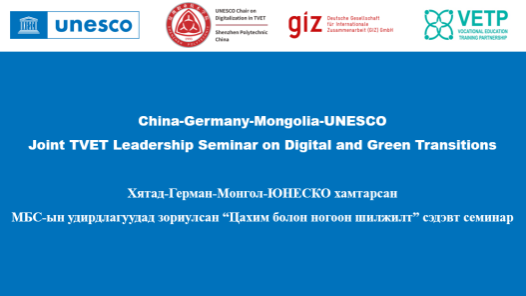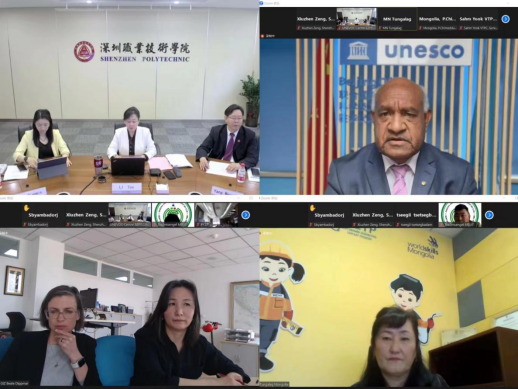The China-Germany-Mongolia-UNESCO Joint TVET Leadership Seminar on Digital and Green Transitions was successfully held online on 18-19 April 2003. The seminar was organized by UNESCO Chair on Digitalization in TVET & UNEVOC Center at Shenzhen Polytechnic (SZPT) in China, GIZ in Germany, Vocational Education Training Partnership in Mongolia (VETP), and UNESCO Beijing Multi-Sectoral Regional Office. The main objective of the seminar was to exchange insights, solutions, and practices on digital and green transitions among the TVET community in UNESCO, China, Mongolia, and Germany topromote digital transformation, engage in greening TVET, and contribute to global sustainable development. Nearly 200 leaders from more than 70 TVET institutions or centers in Mongolia attended the seminar.

Ms. Li Yue, the vice president of Shenzhen Polytechnic, Ms. Beate Dippmar, the Cluster Coordinator of Workforce and Economic Development of GIZ and Ms. Tungalag Chimid, the Director of VEPT, delivered speeches in the seminar opening session. They all expressed their expectations that this seminar could promote the cooperation and exchange on the dual transition of digital and green in TVET, and jointly contribute to global socioeconomic sustainable development.

In TVET digital transformation session, seven experts delivered presentations on the theme of digital transformation in TVET. Prof. Yang Wenming, coordinator of UNESCO Chair on Digitalization in TVET and UNEVOC Centre at Shenzhen Polytechnic, made a presentation on “A global perspective on digital transformation in TVET”. Prof. Li Yue, the vice president of Shenzhen Polytechnic, shared the practices of digital transformation in Shenzhen Polytechnic. Ms. Tsetseg-Ulzii, elearning expert of the GIZ, shared the practices of the digital transformation in Mongolia, focusing on introducing the U-TVET platform for T&L. Mr. Pan Liucheng, expert on loan of UNESCO-UNEVOC and programme officer of UNEVOC Centre at Shenzhen Polytechnic, introduced UNESCO-UNEVOC’s research on Digital Transformation in TVET. Prof. Chi Ruinan, Deputy Dean of AI School at Shenzhen Polytechnic, shared the promising practice on how to develop digital programmes. Prof. Wang Yongxue, elaborated on Qualifications and Education of ICT Talents. Prof. Zhu Xiaochun, Deputy Dean of School of Automotive and Transportation Engineering at Shenzhen Polytechnic, shared solutions to digital transformation of Traditional TVET Programmes.
In TVET green transition session, five presentations were made by experts from the four organizers. Mr. Robert Parua, Education Programme Specialist of UNESCO Beijing Multi-Sectoral Office, introduced SDG for 2030 and identified roles of TVET leaders to promote greening TVET. Mr. Buchel Marco, expert of GIZ, shared the greening practices in Germany. Ms. Enkhgal Tuuguu, senior staff of Polytechnic College of Engineering and Technology (PCET) in Mongolia, presented the policy and implementations of greening of PCET. Ms. Zhong Zhuoya, Programme Officer of UNEVOC Centre at Shenzhen Polytechnic, presented the greening TVET Practices at Shenzhen Polytechnic. Dr. Wang Xiaoxiang, expert of Institute for Carbon-Neutral Technology at Shenzhen Polytechnic, presented Shenzhen Polytechnic’s solution to qualification and Education of “Carbon Peaking and Carbon Neutrality”.
Mr. Robert Parua delivered a closing speech on behalf of all the organizers. He expressed his congratulations on the successful holding of the seminar. He stressed that Shenzhen Polytechnic as a new UNESCO Chair on TVET digitalization was already very active in promoting digital transformation in global TVET community and acknowledged the great coordination and support from SZPT, GIZ and VETP. He commented that the seminar had set a model as a joint cooperation between institutions in China, Germany, Mongolia, and UNESCO in using the UNESCO Chair and UNEVOC platforms to exchange valuable knowledge, skills, experience, and sharing of good practices.
